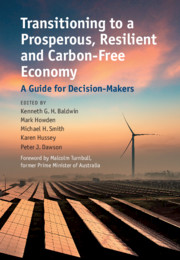Book contents
- Transitioning to a Prosperous, Resilient and Carbon-Free Economy
- Transitioning to a Prosperous, Resilient and Carbon-Free Economy
- Copyright page
- Dedication
- Contents
- Figures
- Tables
- Contributors
- Foreword
- Introduction
- 1 Policy Frameworks and Institutions for Decarbonisation: The Energy Sector as ‘Litmus Test’
- Technologies for Decarbonising the Electricity Sector
- Example Economies
- Cities and Industry
- Land Use, Forests and Agriculture
- Mining, Metals, Oil and Gas
- Addressing Barriers io Change
- Index
- References
1 - Policy Frameworks and Institutions for Decarbonisation: The Energy Sector as ‘Litmus Test’
Published online by Cambridge University Press: 08 October 2021
- Transitioning to a Prosperous, Resilient and Carbon-Free Economy
- Transitioning to a Prosperous, Resilient and Carbon-Free Economy
- Copyright page
- Dedication
- Contents
- Figures
- Tables
- Contributors
- Foreword
- Introduction
- 1 Policy Frameworks and Institutions for Decarbonisation: The Energy Sector as ‘Litmus Test’
- Technologies for Decarbonising the Electricity Sector
- Example Economies
- Cities and Industry
- Land Use, Forests and Agriculture
- Mining, Metals, Oil and Gas
- Addressing Barriers io Change
- Index
- References
Summary
Reducing greenhouse gas emissions is an economy-wide challenge so policy to reduce emissions has to accommodate varying scope and scale to reach all sectoral processes. This chapter focuses on the complexity and challenges inherent in developing climate policy for electricity supply and for energy use in all industry and transport sectors. Policy frameworks need to take account of the context, competing social and economic objectives, global competitiveness and the expectations of industry participants and consumers. Energy policy to accommodate climate imperatives will always involve integrating policy into existing frameworks, which adds to the layers of complexity. The advantages and disadvantages of the variety of tools required to create incentives for investment, consumer behaviour change and institutional adaptation are also considered. Inevitably, policy formulation will involve hard political choices, so the chapter concludes with thoughts on managing the politics.
- Type
- Chapter
- Information
- Transitioning to a Prosperous, Resilient and Carbon-Free EconomyA Guide for Decision-Makers, pp. 7 - 38Publisher: Cambridge University PressPrint publication year: 2021

